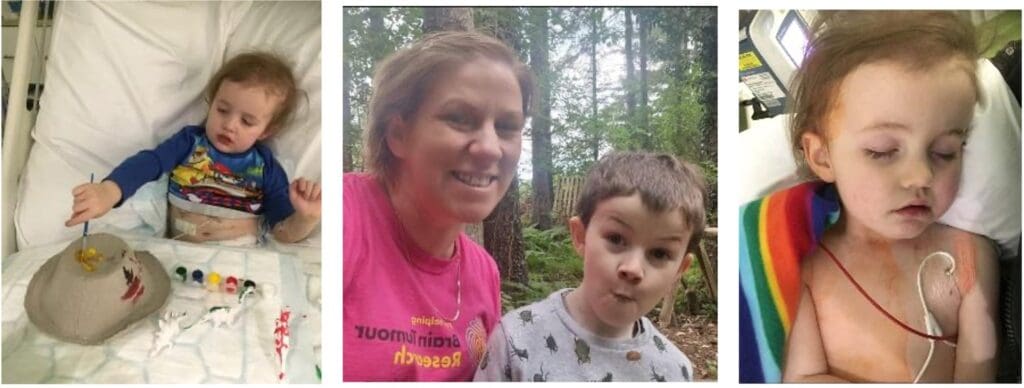A North Wales mum will honour a promise she made to her son after he was diagnosed with brain cancer when she runs the TCS London Marathon in April.
Catherine Kelly, never thought her son, Edward, would be alive five years after he was diagnosed with a medulloblastoma brain tumour and obstructive hydrocephalus in October 2018 aged just three. The infant endured emergency surgery followed by gruelling chemotherapy.
Doctors initially told the Holywell mum-of-five that her son’s inability to sleep for more than 90 minutes at a time was due to the toddler not being left to self-soothe.
She said: “The lack of sleep became something we lived with. By two-and-a-half, Edward developed a wide gait and kept bumping into things. We lived in an old house and had changed the furniture around due to his little sister Edith, starting to crawl so thought his clumsiness could be down to the layout changes.”
Shortly after Edward’s third birthday, the family were given the devastating news of a mass causing a blockage in his brain.
Now, five years later, Edward who is eight, is enjoying school and getting ready to cheer on his mum as she prepares to take part in the world-famous 26.2 mile race in aid of the charity Brain Tumour Research.
Catherine said: “We were in an isolated room when Edward was having his final round of high dose chemotherapy and I was watching the London Marathon while he slept. I promised us both that if Edward made it through treatment, I’d sign up.
“Five years post his treatment completion date is a significant milestone and that anniversary falls a few weeks after the marathon takes place. I can’t repay everyone that has been involved in giving us our son back but if I can help make a difference to other people going through a devastating diagnosis I will feel like I’m giving something back.”
The commissioning officer at Flintshire County Council and self-professed amateur runner, said: “I rarely follow through on anything. I have big ideas and great plans and never actually do it, but with this – I’ve never been more determined and committed in my life. It’s a complete lifestyle change for me to be capable of running a marathon and I will do it. We never kind of thought we’d be in this position. I want to help keep the conversation about brain tumours going.
“Finding out why this happened and the how this is still happening to children and adults is far more important than I first realised, we need to change the narrative and make people understand that brain tumours are not rare. We desperately need more research, kinder treatments, better outcomes and more survivors.”
Carol Robertson, national events manager for Brain Tumour Research, said: “With one in three people knowing someone affected by a brain tumour, Edward’s story is, sadly, not unique. Brain tumours kill more children and adults under the age of 40 than any other cancer, yet just 1% of the national spend on cancer research has been allocated to this devastating disease since records began in 2002.
“We’re determined to change that but it’s only by working together we will be able to improve treatment options for patients and, ultimately, a cure. We’re really grateful for Catherine’s support and will be there to cheer her across the finish line in April.”
Brain Tumour Research funds sustainable research at dedicated centres in the UK. It also campaigns for the Government and larger cancer charities to invest more in research into brain tumours in order to speed up new treatments for patients and, ultimately, to find a cure. The charity is the driving force behind the call for a national annual spend of £35 million in order to improve survival rates and patient outcomes in line with other cancers such as breast cancer and leukaemia.

